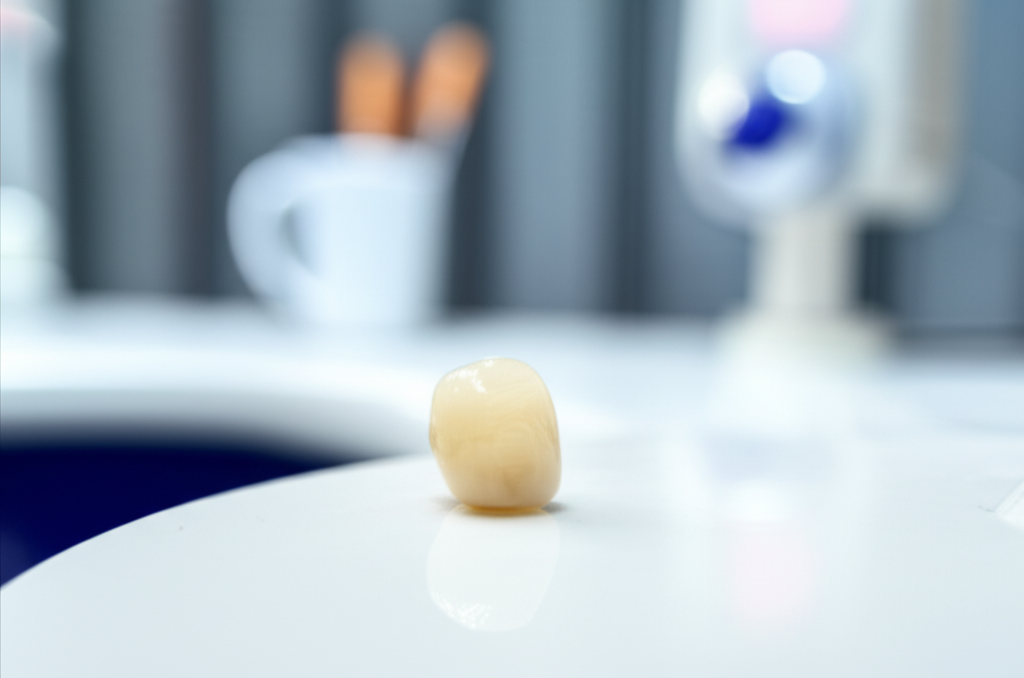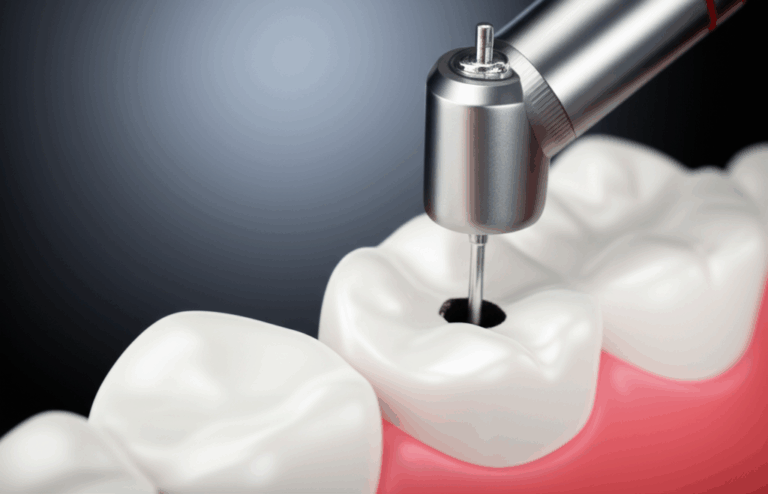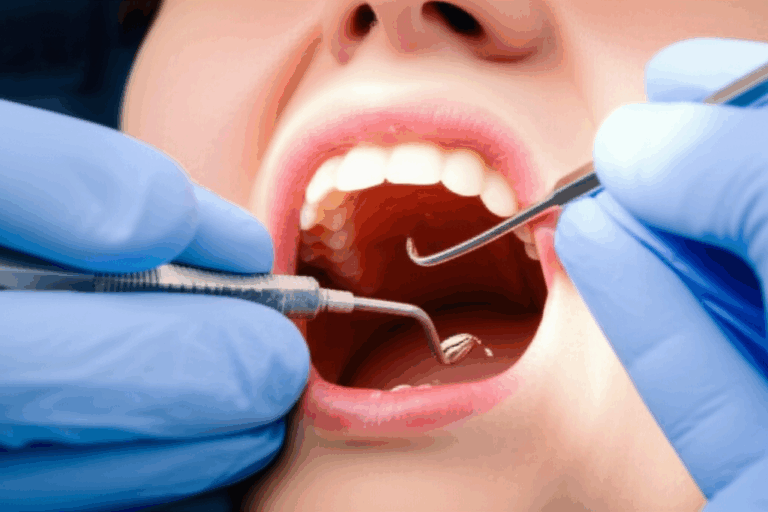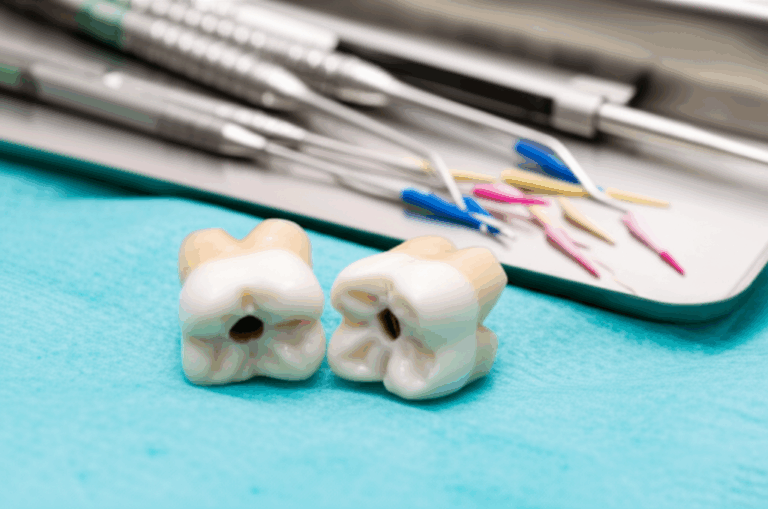
Can a Dentist Put a Fallen or Loose Crown Back On? Your Easy Guide to Re-cementation
When your dental crown comes off, it can be pretty scary. You might feel some pain, be worried about your appearance, or just feel nervous about what to do next. The great news—most of the time, a dentist can put your crown back on and get you smiling again. In this simple guide, you’ll find all the steps and answers you need if your crown has come loose, what decides if it can go back on, and what you’ll see at your dental visit. Here you’ll get real tips, clear steps, and advice from years of helping people with dental problems.
Table of Contents
Why Read This Guide?
Let’s be honest—no one wants their dental crown to fall off. If it does happen, you don’t need to freak out! This guide will help you:
- Know what to do right away
- See how dentists fix a loose or fallen crown
- Learn what you can do to stop it from happening again
- Know what’ll happen at your dentist appointment
- Make good choices about your teeth
You’ll find simple facts, easy-to-read tables, and helpful tips so you’ll feel ready if this happens.
What to Do When Your Crown Falls Off
Sometimes it happens after eating something sticky, biting something hard, or just out of nowhere. Suddenly your crown isn’t there anymore.
Here’s what you should do right away:
Steps to Take
Try to find the crown—even if you swallowed it, it usually passes through fine (but still call your dentist). Rinse it gently with water, but don’t scrub or use cleaners.
Rinse your mouth with warm water. If there’s anything stuck on your tooth, gently use a soft toothbrush. Don’t use mouthwashes that burn or strong chemicals.
The tooth under your crown might be sensitive or look strange. Don’t chew on that side, and keep it as clean as you can. You can buy temporary dental cement at some stores, but don’t use any kind of glue—it can ruin your tooth and make things worse.
Even if there’s no pain, call your dental office right away. The missing crown leaves your tooth open to germs and problems.
Can a Dentist Just Put My Crown Back On?
Lots of people wonder: “Can my dentist just glue my crown back on, or do I need a whole new one?”
Good News
Most of the time, yes! Dentists can usually put your crown back on if it’s not broken and your tooth is still okay underneath. Many crowns fall off because the glue just wore out or something sticky pulled it off. These are simple fixes for your dentist.
When It’s a Problem
If either the crown or the tooth is broken, or if there’s a bad cavity, gluing it back might not work. Your dentist will tell you after they check your mouth.
What Does the Dentist Check Before Re-cementing?
Dentists don’t just slap the crown back on—they make sure everything is okay first.
What They Look At
- Is the crown in one piece?
If your crown is cracked, broken, or chipped, you might need a new one.
- Crown Nice and Clean?
If it’s warped or bent, it might not fit right anymore.
- Is your Tooth Underneath Healthy?
If the tooth below has broken or has a big cavity, the dentist may have to fix it first, or sometimes, you may need a new crown.
- Any Signs of Infection?
If there’s pain, swelling, or the tooth looks infected, dentists may need to do more treatment before the crown goes back on.
- Why Did it Fall Off?
If it just popped off because the old cement wore out, that’s often a quick fix. If it’s because of an accident or because you bit something hard, the dentist will check your bite.
- How Long Has The Crown Been Off?
The less time it’s off, the better. Past a few days, there’s more risk for problems.
Table: Things That Affect If a Crown Can Go Back
| Factor | What Dentist Checks | What it Means |
|---|---|---|
| Crown’s Shape | Cracks, chips, fit | Broken crowns usually need new ones |
| Tooth’s Health | Any decay, if it’s strong | Weak teeth may need extra work |
| Why it Fell Off | Loss of glue, accident, chew | Tells if this will happen again |
| Time | Minutes or days | More time off means more risk for problems |
| Crown Material | Porcelain, metal, etc. | Some crowns stick better than others |
Inside the Crown Re-cementing Procedure
Worried because this has never happened to you? Here’s what usually happens:
Step 1: Look Closely
- The dentist will check your tooth and may take an x-ray to see anything hidden, like a crack or cavity.
Step 2: Cleaning
- The dentist will clean the tooth and inside the crown, getting rid of leftover glue, food or germs.
Step 3: Fitting
- They’ll try the crown in your mouth—making sure it fits just right and your bite feels normal.
Step 4: New Glue
- The dentist puts on special dental cement, puts the crown on, then wipes up any extra glue.
Step 5: Bite Check
- You’ll bite down on a little paper. If your bite doesn’t feel right, the dentist will fix it before you leave.
Table: What Happens at Your Visit
| Step | What Dentist Does |
|---|---|
| Look & X-ray | Checks for break, cavity, or infection |
| Clean Up | Gets rid of old glue, food, germs |
| Test Fit | Makes sure the crown sits right |
| New Glue | Uses special cement and puts the crown on |
| Check Bite & Clean Up | Makes sure your bite feels good, wipes extra glue |
Is There Ever a Time When My Crown Can’t Go Back On?
Sometimes, you can’t just re-glue your old crown.
When Not to Put it Back
- Crown is Broken Badly
Chipped or broken crowns often don’t fit right, or they won’t last long even if glued.
- Tooth Underneath is Too Damaged
Big cavities or a broken tooth might not hold a crown, so your dentist may need to fix the tooth first—or in rare cases, talk about other options like a bridge or implant.
If you want, learn more about implant dental laboratory solutions to see what today’s dental tech can do.
How Much Does Crown Re-cementation Cost?
The big question—what will this cost?
Re-cementation: Usually Cheaper
- Re-cementing a crown is usually much less than getting a new crown. It costs about $70–$250, depending where you live and what kind of crown you have.
Getting a New Crown
- A new one often costs $800–$1,500 or even more.
Insurance
- Many dental plans will help pay for simple re-cementing. For new crowns, they usually help pay part of the cost. Check with your plan before you go.
How Can I Prevent My Crown From Coming Off Again?
You don’t want to do this again if you can help it. Here’s how to keep your crown safe:
Clean Teeth Every Day
- Brush and floss every day, especially near the gums.
- Go to your dentist for regular cleanings and check-ups.
Eat Smart
- Skip super sticky candy, gum, or caramel.
- Don’t bite down on popcorn kernels, pens, or ice—they break crowns all the time!
Guard Your Teeth
- If you grind your teeth at night, ask your dentist about a night guard.
- Dentist can check your bite every year—sometimes little changes help big-time.
Want to read more about night guards and dental protection? Visit our night guard dental lab partner for simple info.
What Should I Expect After My Crown Is Put Back On?
So your crown is back—now what?
Recovery
- You’re good to go back to normal activities right after your visit.
- You might feel some light pain or sensitivity for a day or two. Call your dentist if biting hurts after a few days.
How to Take Care
- Stick to soft foods for the rest of the day.
- Keep brushing and flossing, but do it gently around the new crown.
- Stay away from sticky foods for a couple days so the cement gets tight.
How Long Will It Stay?
- Crowns that are re-glued can last years if your tooth is healthy.
- Lots of people get a crown glued back on more than once over the years!
- Keep teeth clean and listen to your dental team for the best results.
FAQs About Dental Crowns
Q: How soon should I visit the dentist?
A: As fast as you can! Try to go within a day or two.
Q: Can I glue the crown back with super glue?
A: No way! That’s dangerous and can harm your tooth and health.
Q: Is this a dental emergency?
A: It’s not usually dangerous for your health, but if you have bad pain, swelling, or the tooth feels broken, get in quickly.
Q: What if I swallowed my crown?
A: Stay calm. Most crowns pass through safely, but call your dentist for advice.
Q: How can I make my crown last longer?
A: Brush, floss, skip hard or sticky foods, and get a check-up twice a year.
Key Points to Remember
- Dentists can usually put your crown back if it and the tooth are okay
- Act fast—call your dentist right away if it comes off
- Never use glue, and keep the tooth safe until you get help
- Re-cementing is much cheaper than a new crown
- Good cleaning and eating safe foods are the best protection
- If a new one is needed, a top crown and bridge lab will help your dentist give you a strong, natural look
For more about new dental solutions and materials, your dentist works with some of the best labs and tools out there. For cool updates on what’s next in dental care, check out our favorite digital dental lab.
Take care of your crown, get help fast if it comes off, and remember—a healthy smile is always possible with the right care and team!








